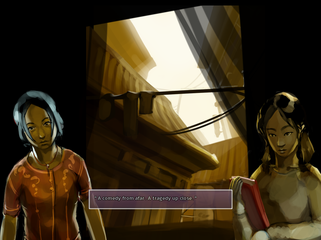HASVERS'S PROFILE
Hasvers


1298

Exeunt Omnes
A game of strategic sophistry. Convince or crush the teenage girl who wants to end your reign of evil.

A game of strategic sophistry. Convince or crush the teenage girl who wants to end your reign of evil.
Search
Filter
 Lying to and deceiving the player
Lying to and deceiving the player
Actually this bad DM thing made me think of a rather peculiar p&p RPG, "Sunshine Boulevard". It's a game you can play only once. Probably not a good experience either. But a very systematic way of going about lying to the player.
 Exeunt Omnes
Exeunt Omnes
Thanks you two! Honestly I didn't expect anything after seeing the games I was up against - but I am certainly not going to complain :P
Instead, I will track down Andy Oxfeld and shower him in tokens of gentlemanly appreciation.
Instead, I will track down Andy Oxfeld and shower him in tokens of gentlemanly appreciation.
 Lying to and deceiving the player
Lying to and deceiving the player
That was not a very good DM.
I just played it, and yes it does. That's mostly a gimmick, but still, funny.
author=nurvuss
Anyway, how about Frog Fractions? I haven't played that yet, but I hear that lies to the player in really interesting ways.
I just played it, and yes it does. That's mostly a gimmick, but still, funny.
 Little Briar Rose
Little Briar Rose
 Last Word (IGMC Version)
Last Word (IGMC Version)
Oh wow! I was sure you'd at least be in that top, but double-congrats on your double-hit combo and being singled out by Ed freaking Greenwood!
 Exeunt Omnes
Exeunt Omnes
 Lying to and deceiving the player
Lying to and deceiving the player
A better example then: detective novels. If you've read a few of them, you can feel the general form that the clues and motives are going to take. This genre is unique in that every book is also a game, a puzzle that you can solve - you are not necessarily expected to, but the author is expected to provide you with everything you need to solve it, else it feels like they are cheating.
Sure, a lot of the genre tropes may feel a little contrived, but nothing so bad as to make the characters feel inhuman. And I maintain that it's pretty much the same as the creating-the-setting part of GMing - without the reactivity, sure, but the reactivity is supposed to respond to the actions of players, not to change the motives of the NPCs on the spot.
LockeZ> I will have to look up LA Noire, then! My problem with Phoenix Wright is that it's still basically a point & click dynamics: there is a precise order in which you must click on things and so on. It's still pretty close to the idea of having to double-check every single fact.
That makes it particularly infuriating when you've basically understood the whole case but you have no way of jumping ahead and delivering the one important piece of information.
I would prefer a game that only tests the actions that you take as a result of this information: for instance, you play a vigilante and you're free to kill whoever you think is the culprit at any time, even if you are mistaken (but you should also be careful not to be caught). You don't have a dev-defined series of hoops to jump through, only a set of actions that are always available and that you choose to apply depending on what you have understood.
Although it would be even more exciting to see this dimension of information handling added into a game of a completely different genre, where it would be new and unique; say a survival game, or even an RPG (where instead of reacting to a linear story, or even a branching story, you could take the initiative of trying to understand what is going on and who to beat up for great justice; open-world WRPG claim to do this, but basically they just have you follow along and do fetch quests and people never lie or someone else will tell you about it).
Sure, a lot of the genre tropes may feel a little contrived, but nothing so bad as to make the characters feel inhuman. And I maintain that it's pretty much the same as the creating-the-setting part of GMing - without the reactivity, sure, but the reactivity is supposed to respond to the actions of players, not to change the motives of the NPCs on the spot.
LockeZ> I will have to look up LA Noire, then! My problem with Phoenix Wright is that it's still basically a point & click dynamics: there is a precise order in which you must click on things and so on. It's still pretty close to the idea of having to double-check every single fact.
That makes it particularly infuriating when you've basically understood the whole case but you have no way of jumping ahead and delivering the one important piece of information.
I would prefer a game that only tests the actions that you take as a result of this information: for instance, you play a vigilante and you're free to kill whoever you think is the culprit at any time, even if you are mistaken (but you should also be careful not to be caught). You don't have a dev-defined series of hoops to jump through, only a set of actions that are always available and that you choose to apply depending on what you have understood.
Although it would be even more exciting to see this dimension of information handling added into a game of a completely different genre, where it would be new and unique; say a survival game, or even an RPG (where instead of reacting to a linear story, or even a branching story, you could take the initiative of trying to understand what is going on and who to beat up for great justice; open-world WRPG claim to do this, but basically they just have you follow along and do fetch quests and people never lie or someone else will tell you about it).
 Lying to and deceiving the player
Lying to and deceiving the player
author=CrystalgateMy bad then. Still, there's a significant difference between always having to check the truth of some statement by confronting it to a better source of information (e.g. some library or testing it directly), and being able to deduce it from other things you already know. You appear to talk only about the former, while I'm only speaking of the latter, so I guess it's a slight misunderstanding.
I have made no such assumptions.
I'm not sure why you seem to dislike the idea that the player should learn the dev's logic. What can be painful is point&clicks where a different thought process must be guessed for every puzzle, but if the logic is consistent throughout, then it's just learning how to play the game. In Portal, the devs have created their own logic for how the portals work; that doesn't mean that you cannot learn this logic and play with it.
In any case, I would love to see a game where handling information (true or false) is actually one of the main aspects of the gameplay. Except for Pathologic, I have the hardest time thinking of a game where this doesn't reduce to "talk to everyone, click on everything, and use every object on every other".
 Fundamental RPGology Thread
Fundamental RPGology Thread
This topic made me think that a great alternative to the GM trying to change the rules is having an unreliable narrator.
The story can be altered not through the intervention of a higher power (godly or GMy) but by negotiations about what exactly happened and how much we're willing to suspend disbelief. Disbelief could be an actual resource to manage, slowly eroded in phases of realistic build-up (or even by deciding to lose some battles) so that one can afford the occasional heroic climax
Edit: Which actually crosses into very standard territory in p&p design (but then again, in terms of game design theory, p&p > Interactive Fiction > everything else ever </gratuitous troll>)
The story can be altered not through the intervention of a higher power (godly or GMy) but by negotiations about what exactly happened and how much we're willing to suspend disbelief. Disbelief could be an actual resource to manage, slowly eroded in phases of realistic build-up (or even by deciding to lose some battles) so that one can afford the occasional heroic climax
Edit: Which actually crosses into very standard territory in p&p design (but then again, in terms of game design theory, p&p > Interactive Fiction > everything else ever </gratuitous troll>)
 Lying to and deceiving the player
Lying to and deceiving the player
You're assuming that some pieces of info are just wrong for no reason, so the only way to know that they are wrong is to cross-check them - which is not a great design decision, as it involves doing the same thing (e.g. checking in the library) again and again.
What I am suggesting is that there should be a reason every time someone lies, and this reason should be part of a consistent set of causes or rules that can be learned. "guessing the logic the game creator is using" becomes simply "learning how to play the game".
However, these don't have to be stupid abstract rules like in logic puzzles (e.g. the Dwarfs always lie except when they are underground), they can be part of the plot/setting, like figuring the motivations of the NPCs to get a feeling of who would lie, when and why. That's a major part of tons of social games: poker and other bluffing games, detective games and Mafia/Werewolf, and so on. That's also part of what the GM provides in any sufficiently RP-oriented pen&paper session.
What I am suggesting is that there should be a reason every time someone lies, and this reason should be part of a consistent set of causes or rules that can be learned. "guessing the logic the game creator is using" becomes simply "learning how to play the game".
However, these don't have to be stupid abstract rules like in logic puzzles (e.g. the Dwarfs always lie except when they are underground), they can be part of the plot/setting, like figuring the motivations of the NPCs to get a feeling of who would lie, when and why. That's a major part of tons of social games: poker and other bluffing games, detective games and Mafia/Werewolf, and so on. That's also part of what the GM provides in any sufficiently RP-oriented pen&paper session.














